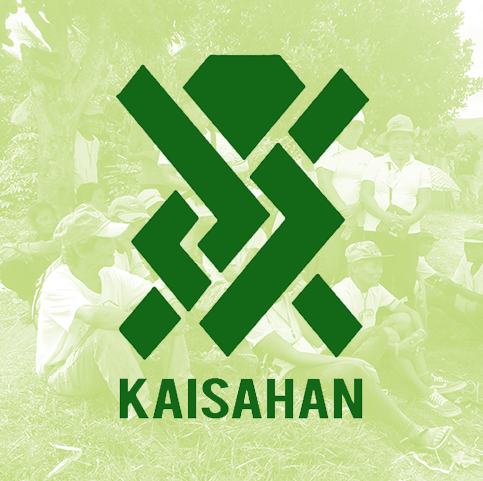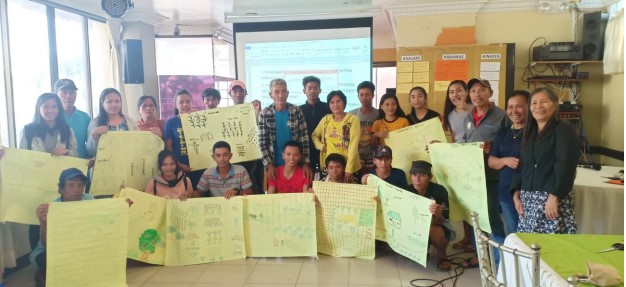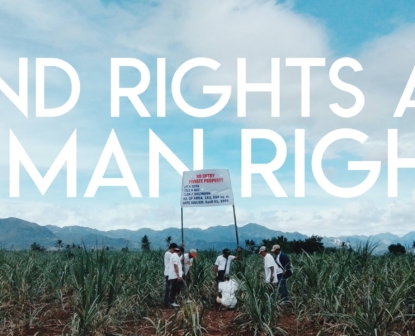Project
Bridging Generational Gap in Farming
-
Amount Funded
84,350 EUROProject Duration
15 Sep 2019 - 15 Sep 2020 -
-
Lead organisation
-
KAISAHAN is a non-government organisation promoting a sustainable and humane society. It empowers marginalised groups in rural areas, especially farmers and farm workers to undertake their own development, participate fully in democratic processes, and demand their rightful share in the stewardship of the land and fruits of their labour. To achieve its goal, KAISAHAN trains farmer paralegals that are adept at agrarian reform laws and regulations and are able to assert their rights and assist other farmers in claiming their land rights. KAISAHAN engages with appropriate government institutions in creating and ensuring a positive policy environment for farmers and marginalised sectors. It also provides legal services to farmers involving their land rights, organising and linking farmers with agencies and institutions that provide sustainable use and maximisation of land and its resources. In its 28 years of existence, the Organisation has supported farmers in claiming their rights under the Comprehensive Agrarian Reform Program (CARP). Notably, in 2015 KAISAHAN assisted agrarian reform beneficiaries (ARBs) in Ormoc and Leyte who had titles awarded under the CARP but could not take possession of the same because of the land owner’s resistance. Through KAISAHAN’s intervention and engagement with the Department of Agrarian Reform (DAR) and the security sector, particularly the Philippine National Police (PNP), the ARBs were officially installed in their awarded lands. KAISAHAN has also trained farmer paralegals who are now active leaders in their respective communities. As an organisation engaged in policy advocacy, KAISAHAN is one of the prime movers in the passage of Republic Act 9700 or the Comprehensive Agrarian Reform Program with Extension and Reforms (CARPER). At present, it serves as the secretariat of the Campaign for Land Use Policy Now, a network of civil society organisations (CSOs) and people’s organisations (POs) pushing for the passage of the National Land Use Act (NLUA).
-
Organisation
KAISAHAN is a non-government organisation promoting a sustainable and humane society. It empowers marginalised groups in rural areas, especially farmers and farm workers to undertake their own development, participate fully in democratic processes, and demand their rightful share in the stewardship of the land and fruits of their labour. To achieve its goal, KAISAHAN trains farmer paralegals that are adept at agrarian reform laws and regulations and are able to assert their rights and assist other farmers in claiming their land rights. KAISAHAN engages with appropriate government institutions in creating and ensuring a positive policy environment for farmers and marginalised sectors. It also provides legal services to farmers involving their land rights, organising and linking farmers with agencies and institutions that provide sustainable use and maximisation of land and its resources. In its 28 years of existence, the Organisation has supported farmers in claiming their rights under the Comprehensive Agrarian Reform Program (CARP). Notably, in 2015 KAISAHAN assisted agrarian reform beneficiaries (ARBs) in Ormoc and Leyte who had titles awarded under the CARP but could not take possession of the same because of the land owner’s resistance. Through KAISAHAN’s intervention and engagement with the Department of Agrarian Reform (DAR) and the security sector, particularly the Philippine National Police (PNP), the ARBs were officially installed in their awarded lands. KAISAHAN has also trained farmer paralegals who are now active leaders in their respective communities. As an organisation engaged in policy advocacy, KAISAHAN is one of the prime movers in the passage of Republic Act 9700 or the Comprehensive Agrarian Reform Program with Extension and Reforms (CARPER). At present, it serves as the secretariat of the Campaign for Land Use Policy Now, a network of civil society organisations (CSOs) and people’s organisations (POs) pushing for the passage of the National Land Use Act (NLUA).
-
Project
The project of Bridging Generational Gap in Farming increases the involvement of the youth in the farm activities of their families through an innovation called ‘Family Farm Plot Development and Field-Based Mentorship Program‘. This initiative taps on the inclination of the youth to agriculture through out-of-the-box agricultural capacity strengthening, but also their relationship with their agrarian reform beneficiaries (ARB) parents through a mentorship feature. This innovation also taps on the preservation and transfer of traditional farm practices through new-age technologies and support service access for both seniors and the next generation of farmers. The project also works with:
- Elderly farmers with additional farm help. This is done by increasing the involvement of family members especially the youth in farm activities by transferring customary and acquired farming technologies through field school and series of sharing sessions with young family members. Young members of ARB households also have increased participation in diversified family farming that is achievable through orientation on the agrarian reform programme, series of trainings, and field-based family farm development programme and mentorship.
- Young members of ARB households with increased participation in family farming. This happens through orientation on the importance of sustaining the cultivation of land awarded to elderly members of their families under the agrarian reform programme, a series of sharing and trainings, and a field-based family farm development and mentorship programme.
- Diversified farming processes and techniques that are preserved and transferred to the next generation of farmers. This involves using educational communication materials to document, preserve, and disseminate the best practices done in cultivating the family farms.
-
-
The project of Bridging Generational Gap in Farming increases the involvement of the youth in the farm activities of their families through an innovation called ‘Family Farm Plot Development and Field-Based Mentorship Program‘. This initiative taps on the inclination of the youth to agriculture through out-of-the-box agricultural capacity strengthening, but also their relationship with their agrarian reform beneficiaries (ARB) parents through a mentorship feature. This innovation also taps on the preservation and transfer of traditional farm practices through new-age technologies and support service access for both seniors and the next generation of farmers. The project also works with:
- Elderly farmers with additional farm help. This is done by increasing the involvement of family members especially the youth in farm activities by transferring customary and acquired farming technologies through field school and series of sharing sessions with young family members. Young members of ARB households also have increased participation in diversified family farming that is achievable through orientation on the agrarian reform programme, series of trainings, and field-based family farm development programme and mentorship.
- Young members of ARB households with increased participation in family farming. This happens through orientation on the importance of sustaining the cultivation of land awarded to elderly members of their families under the agrarian reform programme, a series of sharing and trainings, and a field-based family farm development and mentorship programme.
- Diversified farming processes and techniques that are preserved and transferred to the next generation of farmers. This involves using educational communication materials to document, preserve, and disseminate the best practices done in cultivating the family farms.
-
Farming families breaking the intergenerational gap to expand agriculture and increase their farm production
Reduction of generation gap in farming has put more food on the table for six families in the Philippines and as a result increased the interest of more youth in agriculture. With the support of Kaisahan, six families were brought together for networking, skills and capacity building on innovative traditional practices, through different approaches
To achieve this, Kaisahan created an environment for intergenerational dialogue that identified issues and concerns of the young and elderly farmers within the families, with six family farms being set up to showcase diverse farm plots to fellow members. They were taken through project development training with the result of submission of proposals for funding and support by the local governments. These farming families actively participated in all the activities conducted in their farm plots and group activities and have been able to produce their own food without buying from the market. As a result, more members have set up farms and they are directly contacting farmer technicians to make inquiries on how best to improve their farming practices.
Education and communication materials development training for the youth empowered and allowed them to produce the farming family video stories. The video documentation of farming practices expanded reach when they were shared on social media platforms popular among the youth to mobilise more youth to gain an interest in farming. The youth also created a chat group for future communication and coordination. This chat group was developed to overcome the challenges brought about by COVID 19 that limited in person interactions, and it sustained sharing, communication and coordination among farming families, the youth and the project team. In the first session, one youth shared his experience:
““Natutunan namin na ang mga magsasaka ay sila ang nagbibigay ng source ng kakainin sa bawat tahanan sa mundo. Malake ang parte nila sa atin dahil sila/kanila meron tayo kakainin sa araw-araw kaya naniniwala kami na “Farming is Life”.
(We learned that farmers provide food source to each and every home. They play a significant part in food security and that is why we believe that “Farming is Life”.)
One of the lessons learnt is that increasing youth involvement in agriculture requires a mix of approaches including letting them experience farming activities, marketing their products, acknowledging their ideas, and giving them space to speak up and making them vital within the process. As a result, there was improved intergenerational engagement and collaboration in farming as the elders become more open to giving the youth more decision maker. This was shared by a Kaisahan member, Erlinda to Orkafarm Magazi;
“I love my children and I appreciate them more now because of family farming. I was impressed by their willingness to help in the farm. They are really hardworking children. I enjoy family farming because I was able to bond with my children while being productive.”
One of the most significant impact of the project is the young farmers’ initiative in setting-up their own organization called the Ormoc-Kananga Young Farmers Association (ORKAYFA) to sustain their efforts through social media groups where they exchange their farming activities and concerns with each other. This made them more involved and interested in what they have done in this project, as shared by one of the youth in the first sharing session;
“Bilang youth, ang maiaambag naming sa pag-uuma o pagsasaka ay ang aming kaalaman at kapasidad na maaaring makatulong sa pagyabong ng sinasaka at pati narin makatulong o maging kaagapay ny aming ina’t ama sa pagtatanim.”
(As youth, what we can contribute are our knowledge and capacities that could be of help in enriching farm inputs and at the same time being our parents’ farming companions.)
The project is considered successful since it was able to build the capacity of the young farmers to utilize their land for food production and enhancing their food security. Through the networks and social media platforms, the group continues to create a positive impact on the community. ORKAYFA is now embarking on fundraising and resource mobilization from different sources through development of proposals and pursuing learning and networking opportunities
xxxxxx
Quote
“Natutunan namin na ang mga magsasaka ay sila ang nagbibigay ng source ng kakainin sa bawat tahanan sa mundo. Malake ang parte nila sa atin dahil sila/kanila meron tayo kakainin sa araw-araw kaya naniniwala kami na “Farming is Life”. “We learned that farmers are provide food source to each and every home. They play a significant part in food security, that is why we believe that “Farming is Life”.”

Link to project objectives | Experiences & Achievements KAISAHAN, together with their partner farming families, have indeed made significant strides in bridging the generational gap in farming. Through their Innovate & Learn project, they were able to richly explore and answer the following learning questions:
- How can family farming increase the interest of youth in agriculture?
- How can we convince the elder farmers and the youth to collaboratively work in the cultivation and management of family farms?
- How can we prepare the young in the difficult task of sustaining family farms?
According to KAISAHAN, the following some of the successful approaches that contributed to their fruitful project are the following:
- Inter-generational dialogue identifying issues and concerns of elder and young farmers within families.
- Video documentation of farming practices that can be shared across social media which is popular among the youth. This also was an effective organizing approach in getting the youth interested again in farming while incorporating the use of new technologies.
- All the six farming families actively participated in all activities conducted in their farm plots and even during group activities. They are directly contacting the farmer technicians to inquire on what they need to do to address their farming concerns. As a result, farming families were able to produce their own food without buying from the market.
- The creation of the chat group to sustain the sharing, the communication and coordination among farming families, the youth and the project team was a perfect response to continue the process and development despite COVID restrictions.
- The project benefitted a lot from the IEC development training as we have produced half a dozen youth who are now capable of developing IEC materials. The youth trained assisted our IEC officer in producing most of the farming family video stories. The IEC Training also established rapport among the young family members and documenters, which led to the creation of a chatgroup for future communication and coordination.
- The project development training workshop was also successful as the participants successfully drafted proposals to be submitted to local government for support. We look forward to more developed proposals from the community as their knowledge on what are the available opportunities for support and on how to access it are expanded.
- The Farm Tripping and Youth Assembly enabled elder and young farmers to witness the development of six Family Farms and a new set of farmers within these families. It was also a moment of pride for the farming families to showcase their diverse farm plots to their fellow members.
Through their project, they emphasized how it is very much possible to increase youth involvement in agriculture but it requires various approaches to engagement. Among these are letting them experience farming activities and marketing the products, acknowledging their ideas, and giving them space to speak up—making them vital within the process. Elderly and young family members can work collaboratively as long as their vision, goal, and farm development plan are clear. Elderly farmers should also be more open to give the youth more decision-making power. “I love my children and I appreciated them more now because of family farming. I was impressed by their willingness to help in the farm. They are really hardworking children. I enjoy family farming because I was able to bond with my children while being productive.” – Erlinda, KAISAHAN member on Farming with Family as quoted from the Orkafarm Magazine For more, click here. One of the most significant impact of the project is the young farmers setting-up their own organization called the Ormoc-Kananga Young Farmers Association (ORKAYFA) to sustain their efforts. For updating, they have a social media group where they exchange their farming activities and concerns with each other. This was done on their own initiative and not suggested by the project staff. The exchange and camaraderie made them more involved and interested in what they have done in this project.
“Bilang youth, ang maiaambag naming sa pag-uuma o pagsasaka ay ang aming kaalaman at kapasidad na maaaring makatulong sa pagyabong ng sinasaka at pati narin makatulong o maging kaagapay ny aming ina’t ama sa pagtatanim.” “As youth, what we can contribute are our knowledge and capacities that could be of help in enriching farm inputs and at the same time being our parents’ farming companions.” -KAISAHAN Youth during the First Sharing Session https://app.box.com/file/807693550269
Links to outputs Caselet Magazine Betoro Family’s Way! https://youtu.be/eCDw2RI0WBk Rightsholders Voices https://youtu.be/WostnVNaAh4 Future plans
“KAISAHAN would like to express our sincerest thanks to VOICE PH for taking on this project and helping us flesh out approaches and learnings on family farming, especially getting the youth reinvested in agriculture. It was truly a pleasant surprise for us when the youth participants of this project decided to form their own organization to sustain their efforts and invite more youth to join them. From this initiative, perhaps one bold suggestion we could make is for VOICE is to invest on programs in developing the rural youth’s potential as rightsholders and explore their capacity to innovate in agriculture.”
After the project’s conclusion, ORKAYFA had started exploring other opportunities as an emerging organisation, submitting their ideas to possible funders and learning opportunities.
-
News





